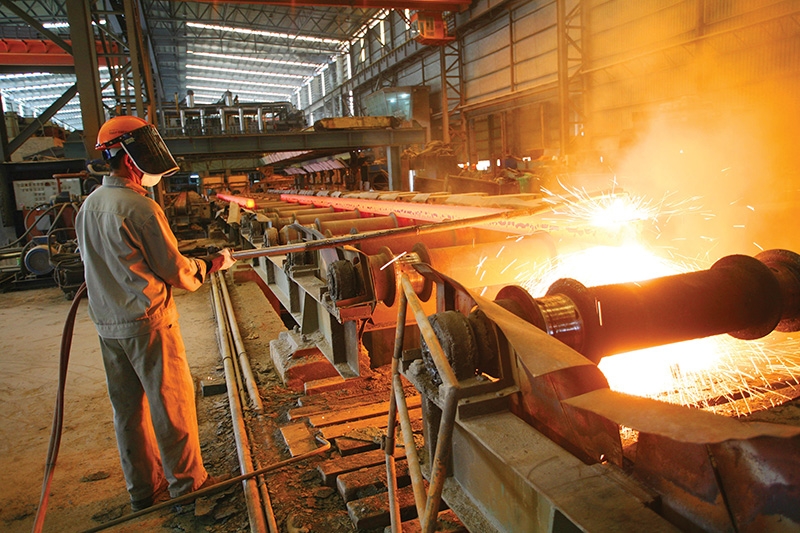Steelmakers question timing of product tax adjustments
 |
| Delivery delays are one reason why there has been a sharp increase in steel prices in recent times. Photo: Le Toan |
Under the proposal, Vietnam plans to impose a 5-per-cent export tax on steel billets and cut the import tax on some products. This move comes as steel prices have increased sharply since the beginning of the year by nearly 40 per cent, affecting the disbursement progress of public investment projects and input costs of many manufacturing industries.
“Although it will reduce the state budget revenue, reduction of import tax rates is not expected to be large because current import demand for iron and steel is not high,” stated the Ministry of Finance (MoF), while stressing the key target of stabilising local prices.
This is not the first time the imposition of steel tax has been discussed. If approved, the tax could influence the operation of steel billet makers such as Hoa Phat Group, Taiwanese-backed Formosa, and Vina Kyoei.
If the tax is imposed, these large Vietnamese exporters would need to offer prices uncompetitive in key Asian markets. For instance, Hoa Phat Group is currently the largest exporter of squared billets in the country, with more than 560,000 tonnes, followed by Formosa with an export volume of more than 128,000 tonnes.
To support its members, the Vietnam Steel Association (VSA) has petitioned the government to refrain from applying the tax, saying it is necessary for local mills to keep exporting billets to maintain production, particularly as domestic demand is not high enough to support production levels.
The VSA stressed that the recently rising steel prices are mainly driven by increasing global raw material costs and demand, with some saying that Vietnamese steel will lose its competitiveness, while the domestic market could become fiercer.
Nghiem Xuan Da, chairman of the VSA, said the Vietnamese steel market relies on imported input materials such as scrap steel, coke, ore, and others. When the prices of raw materials increase globally, domestic steel prices will surely rise as well, he said.
Along with that, the pandemic disrupted the global supply chains, causing delays in delivery times – which is another reason for the sharp increase in steel prices.
“Therefore, to cope with the current situation, steelmakers need to boost production, maximise supply capacity, and take measures to reduce costs, while coordinating the supply chain to further reduce prices, stabilise the market, and avoid speculation and hoarding,” Da said, adding that now is not the right time for a tax adjustment.
Nevertheless, the government and related ministries have yet not replied to the VSA’s petition.
A representative of Hoa Sen Group commented that the increase in steel prices not only happens locally but also worldwide, arguing that the price hikes are only happening in the short term. “Thus, there should not be a tax policy to regulate short-term price fluctuations of the market, as proposed by the MoF,” the representative said.
Hiroyuki Iwasa, general director of Vina Kyoei Steel Company, said that the draft related to import tax on steel products will not make any sense at the present time. Prices of finished steel products are heavily affected by global market prices. The new policy, if applied, would increase the existing pressure on domestic manufacturers, forcing some into bankruptcy, according to Iwasa.
What the stars mean:
★ Poor ★ ★ Promising ★★★ Good ★★★★ Very good ★★★★★ Exceptional
Related Contents
Latest News
More News
- Vietnamese businesses diversify amid global trade shifts (February 03, 2026 | 17:18)
- Consumer finance sector posts sharp profit growth (February 03, 2026 | 13:05)
- Vietnam and US to launch sixth trade negotiation round (January 30, 2026 | 15:19)
- NAB Innovation Centre underscores Vietnam’s appeal for tech investment (January 30, 2026 | 11:16)
- Vietnam moves towards market-based fuel management with E10 rollout (January 30, 2026 | 11:10)
- Vietnam startup funding enters a period of capital reset (January 30, 2026 | 11:06)
- Vietnam strengthens public debt management with World Bank and IMF (January 30, 2026 | 11:00)
- PM inspects APEC 2027 project progress in An Giang province (January 29, 2026 | 09:00)
- Vietnam among the world’s top 15 trading nations (January 28, 2026 | 17:12)
- Vietnam accelerates preparations for arbitration centre linked to new financial hub (January 28, 2026 | 17:09)

 Tag:
Tag:




















 Mobile Version
Mobile Version